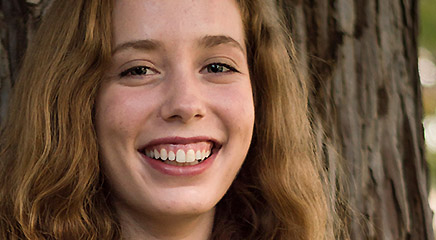Madison Vorva
Madison Vorva
Los Angeles, USA
I grew up loving animals, having pets of all kinds and playing in the creek behind my house with my brothers. In elementary school, I made an endangered species club with some neighbourhood kids. We raised money for conservation by selling knitted scarves.
My eureka moment happened one night during a sleepover with my friend when I was eleven years old. I came across images of dead orangutans who were set afire and beaten to death for entering palm oil plantations in search of food. As I scrolled through these images tears streamed down my cheeks.
I couldn’t believe that the products I ate every day contained palm oil and that the rainforests of Southeast Asia (and now across the tropics) are cleared at alarming rates for palm oil plantations. The conversion of rainforest to monoculture plantations has caused orangutans as well as other endangered species like tigers and rhinos to the brink of extinction. I knew I had to do something.
After learning that unsustainable palm oil production is linked to deforestation, carbon emissions, species endangerment, and human rights abuses I co-founded Project ORANGS, a campaign asking Girl Scouts USA (GSUSA) to adopt a responsible palm oil policy for their cookies.
In 2011, GSUSA announced a palm oil policy, the first policy change driven directly by the efforts of girls in the organization’s 101 year history. In 2014, after delivering 150,000 petitions, Kellogg (GSUSA cookie baker) and palm oil supplier Wilmar adopted deforestation-free policies. For the International Day of Forests I spoke at the UN about girls in conservation.
By connecting millions of people through the story of a Girl Scout cookie, I was able to help transform a global industry towards more sustainable practices.
Today, I teach a group of sixth graders about Southern Californian ecology at my college’s field station. I get to support the programing of the Jane Goodall Institute’s Roots&Shoots program by serving on their board of directors.
My vision for a sustainable future consists of each of us taking responsibility for our daily choices. We must ask questions about the impacts of our purchases. Where did it come from, and at what cost to whom? How can each of us contribute to building a more just and sustainable society in our personal and professional lives?
I agree with Dr. Jane Goodall that one of the biggest obstacles humans face today, is a disconnect between the human brain, and the human heart. We are the most intellectual species to ever walk the planet. As Jane says, “Why then, are we destroying our only home?” Environmentalism isn’t the sole responsibility of hippy tree huggers. It should include everyone.
